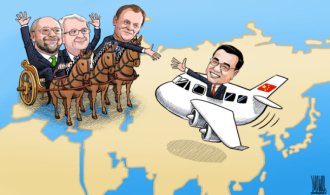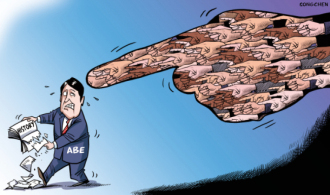China's past century: On CPC's 90th birthday
By Han Dongping (chinadaily.com.cn) Updated: 2011-07-01 11:40This year marks the 90th anniversary of the founding of the Communist Party of China (CPC). The celebration of the CPC's 90th birthday provides a good occasion to reflect on the great changes that have occurred in China in the last 100 years.
The last 100 years has witnessed the great decline and gradual rise of the Chinese nation in the face of foreign aggression and domination, internal chaos and civil wars. From a victim of imperialism, the Chinese nation is becoming an important player in world politics and is making great contributions to world peace today. China's rise has changed the world power configuration. This change in world power configuration not only benefited China but also affected the whole world positively.
One hundred years ago, China lived at the mercy of imperialists. Westerners referred to the Chinese people as the "sick man of East Asia". Foreign powers carved up parts of China as their spheres of influence within China. The British imperialists put up a sign outside their park in Shanghai that read: Chinese and dogs are not allowed. On Chinese soil, Westerners enjoyed extra territorial rights, but the basic rights of Chinese people in their homeland were not guaranteed.
It was from this sad situation that the Chinese nation started its regeneration under the leadership of the CPC.
The defeat of Japanese invaders in 1945, the defeat of US-backed Chiang Kai-shek's forces and the founding of the People's Republic of China in 1949, the rolling back of the onslaught of US forces in Korea in 1950s as they approached Chinese borders were all component parts of the gradual rise of the Chinese nation.
With the founding of the People's Republic of China, the rise of the Chinese nation turned over a new page. With the leadership of the Communist Party of China, New China built up a comprehensive industrial base, including a relatively balanced heavy, light, national defense and high tech industries.
Also in the first 30 years, China invested heavily in the improvement of agricultural infrastructure. Hundreds and thousands of reservoirs and other irrigation projects were constructed throughout China, laying the foundation for the future agricultural takeoff.
China's industrial and agricultural developments have improved Chinese people's living standards significantly. In the first 30 years of the People's Republic of China, Chinese people's life expectancy almost doubled, from 35 years in 1952 to 69 years, almost 20 years ahead of India, with a similar starting point in 1952. This is something that has never happened in human history.
China's economic takeoff in the second 30 years was even more apparent. In 2005, and 2007, I attended two world-famous Salzburg seminars, which were focused exclusively on China's rising economic power and China as a global economic engine. At one seminar, an executive officer of a very big British bank said that without a China portfolio, nobody will take a bank seriously anymore. At the other seminar, the CEO of a Fortune 500 company claimed that every time they came up with a new product, there would be several similar products in China, which would be cheaper, better-made and often easier to use, within six months. In order to compete with China, his company chose to develop products jointly with Chinese research and development firms. China has become an important engine in the global economy.
I grew up in rural China and have done research in the Chinese countryside in the last 30 years. I was born before electricity reached rural China. But today, electricity has entered all rural households, including the most remote ones I have visited. Most farmers have modern amenities such as TVs, refrigerators, electric fans, electric cookers. A significant number even have air conditioners, computers and Internet connections.
In the early 1950s, the grain yield was little more than 100 jin (50 kilograms) per mu (0.16 acre) a year in northern China. Today, the same unit of land can produce almost 20 times that much. Chinese people have basically solved its food security problem today.
China is able to stand out among Third World countries in its development largely because the CPC provided the leadership and coherence that China and Chinese people needed in order to develop and defend itself in a hostile world. In this world of nation-state, national coherence is the crucial element for a nation's well-being.
Like every other country in the world, China today is faced with many challenges and problems, which the Chinese people would like to see resolved as quickly as possible. In the face of these problems, Chinese people should have patience and confidence in themselves.
As a Chinese teaching world politics in the US, I am able to observe and examine China from a distance. This distance enables me to see China from a different angle. China is the only civilization in our world with an uninterrupted history. China did fall a few times, but every time, it managed to come back even stronger than before, partly because the culture produced by the unitary political system it practiced. The first Chinese emperor, Qinshihuang, created this dayitong (unified) political system that has been practiced by the Chinese people on and off until today.
This highly centralized political system can pool both human and other resources to accomplish grand objectives that would be impossible with a different political system. The Chinese people should value this political system that works well for them, and should not waver in their faith in it lightly simply because other people have different political systems.
Finally, on this important occasion, I want to wish the CPC a happy birthday. I hope that it will continue its efforts to improve and strengthen its leadership, in order to take China and the Chinese people to new heights in the future.
Han Dongping is Professor of History and Political Science at Warren Wilson College, NC.











